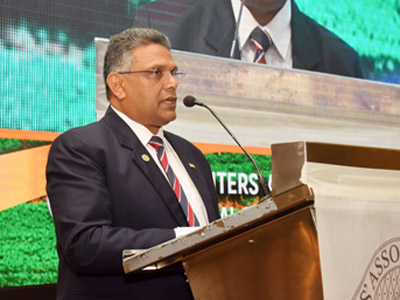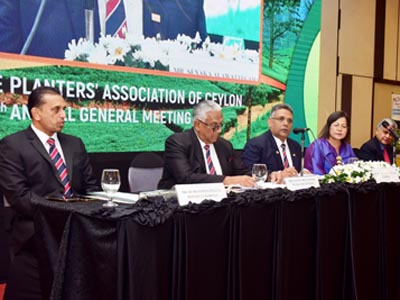Mr. Senaka Alawattegama - Chairman PA's Speech at the 169th PA AGM
 Good evening Ladies and Gentlemen, and a warm welcome to our Chief Guest for this evening, Her Excellency, Dew Gustina Tobing, Ambassador of the Republic of Indonesia to Sri Lanka, Good evening Ladies and Gentlemen, and a warm welcome to our Chief Guest for this evening, Her Excellency, Dew Gustina Tobing, Ambassador of the Republic of Indonesia to Sri Lanka,
Guest of Honour, and Chairman of the Sri Lanka Tea Board, Mr. Niraj De Mel
Chairman pro tem Mr. Sunil Poholiadda
PA Secretary General Mr. Lalith Obeyesekere,
Chairman, Hayleys PLC, Mr. Mohan Pandithage
My esteemed colleagues from the Plantation Companies, And to all stakeholders of the Plantation Industry.
Thank you for gracing us with your presence at the 169th Annual General Meeting of the Planters' Association of Ceylon. The year 2023 has been marked by solemn reflection and formidable challenges for all Sri Lankans. Our nation, once counted among Asia's most developed post-colonial economies, how faces the stark reality of its worst economic hardship. In these trying times we are reminded that lessons learned through adversity are often the most enduring.
One of the most crucial lessons can be found in the lead-up to Sri Lanka's economic crisis, during which we saw numerous theories presented as facts on a range of issues including organic agriculture. None were grounded in facts, but relied on slogans and rhetoric to prop up an unsustainable status quo.
As an industry deeply rooted in the very soil of this nation the plantation and agriculture sectors were the first to detect the early tremors in Sri Lanka's economic landscape. Despite strong incentives to remain silent, the Planters' Association did not shy away from voicing our concerns.
We could not endorse the 100% organic agriculture policy because we understood the unavoidable adverse consequences to communities on the ground and the implications for the wider economy. While the damage has been done, and the policies reversed, the mechanisms by which they came about have still not been adequately considered. Since then we have weathered the storm of COVID-19 and the unprecedented turbulence of 2022 and over the past year have reached some hard-won relative stability.We have seen many encouraging developments within our industry that deserve recognition celebration, and emulation.
 At the same time the systemic challenges facing our industry have continued to intensify.It is now imperative that all stakeholders engage in genuine dialogue and collaborate purposefully to embark on the challenging journey of reform and realignment necessary to secure a sustainable future for the entire plantation industry.' At the same time the systemic challenges facing our industry have continued to intensify.It is now imperative that all stakeholders engage in genuine dialogue and collaborate purposefully to embark on the challenging journey of reform and realignment necessary to secure a sustainable future for the entire plantation industry.'
We stress that such a dialogue must be handled responsibly by all parties. To that end, the PA continues to note with concern the rising tide of misinformation specifically targeting the Sri Lankan plantation industry and the tea sector in particular.
Part of the negative publicity associated with our industry is the result of the worsening impacts]of the economic and cost of living crisis, which has universally intensified hardships for all Sri Lankans, including those in the plantation community!
But increasingly, we find that while certain media are engaged and understand the complexity of the challenges faced in the entire Sri Lankan agriculture and plantation industry many others - including prominent international publications prefer to publish sensationalized stories that propagate false information without any meaningful commitment to fact-checking or balanced journalism. Such claims are then unquestioningly reproduced, creating real and measurable financial damage for the entire Sri Lankan tea industry.
 The collective impact of this damage can be felt in the increased costs associated with investigations from buyers, and unjustified reputational damage incurred by an industry that still remains as the world's leading example of ethically produced tea anywhere in the world. The collective impact of this damage can be felt in the increased costs associated with investigations from buyers, and unjustified reputational damage incurred by an industry that still remains as the world's leading example of ethically produced tea anywhere in the world.
Ultimately such false claims impact the volume and value of Sri Lanka tea sold, and eventually Sri Lanka's export performance as a whole. At a time when our nation continues to struggle with funds to pay for energy, food and medicine, such lax standards in reporting demonstrates a callous disregard for the truth, and the well-being of those whose cause they claim to champion.
To be clear the PA places its total support behind the rights of its employees, the media and all citizens of Sri Lanka to freedom of expression. All we continue to ask for is a reasonable standard of accuracy fairness and objectivity from when reporting on an industry that has sustained this nation for more 150 years.
We remain resolute in our belief that with the right strategic interventions, Sri Lanka can still realize the full commercial potential in the plantation sector. But this can only be achieved through a fundamental re-evaluation and modernization of the foundational policy legal and operational frameworks that underpin our industry. Private sector enterprises like ours require the freedom to take management decisions that sustainably advance their commercial interests, and they depend on stability and consistent conditions over the long term to invest/ recalibrate and thrive.
For Regional Plantation Companies (RPCs) engaged primarily in tea/ rubber/ oil palm/and other agricultural commodities the need for stability is even more critical given our decades-long return on investment horizon. We must set clear,rational, and unwavering industry goals, safeguarded against the shifting winds of political change. Above all else, these goals must be rooted in commercial and scientific realities and respect the principles of private enterprise.In that regard, the PA also continues to call for an urgent re-evaluation of the recent decision by the Government to impose VAT on PCs for all produce excluding Greenleaf and latex rubber. This additional taxation will have a significant impact on prices, at a time when buyers and global supply-demand dynamics are already pushing prices back down quite significantly.
Similarly, we welcome the evaluation of the PCs that is currently underway as part of the Government's broader considerations over the extension of PC leases. With preliminary visits of VAs having been completed, the audit reports that will form the basis of the lease extensions are now in the process of being compiled.
We are hopeful that suitable lease extensions will be granted To date RPCs have led the way on investments into replanting/ diversification, mechanization as well as channeling extensive support towards the welfare of employees, /their families, and the broader estate community. These and other vital measures are absolutely necessary to secure the long-term viability of this industry/and all stakeholders connected to it.
However, we cannot move forward with further investments without a reasonable guarantee of being able to secure their ROl over a long-term horizon.
Therefore, we reiterate the urgency of ensuring that this process is expedited while continuing to ensure that it is conducted in a fair balanced and transparent manner.
Tea Industry Performance
In the tea sector/ wage reform/stands as our most pressing concern Today, nearly 150% of Sri Lankan tea has been harveste under a revenue-sharing model by Tea Smallholders. Their success offers undeniable proof that RPCs, too, must transition/from the archaic daily attendance-based model to a dynamic revenue-sharing model.
After more than a decade of resistance from Trade Unions and affiliated political entities, we are encouraged by the tentative progress that is now emerging and remain cautiously optimistic/that this long over-due reform will finally see the light of day,
The revenue share model stands as the only viable solution to the largest threat to our industry: labor outmigration, While this is a challenge for the entire Sri Lankan economy, the frequency of outmigration is less in Tea Smallholders than in PCs. The reason is simple a revenue share model offers substantially greater value to workers.
 These dynamics have already led most PCs to offer the revenue-sharing model on plots that would otherwise go unharvested. Some estates have seen 20-30% of their crops harvested under this model - tea that would have otherwise gone unharvested, and unsold. Already one estate in the PC sector/has shifted to a 100% revenue share and there no have been zero complaints from workers under this system. These dynamics have already led most PCs to offer the revenue-sharing model on plots that would otherwise go unharvested. Some estates have seen 20-30% of their crops harvested under this model - tea that would have otherwise gone unharvested, and unsold. Already one estate in the PC sector/has shifted to a 100% revenue share and there no have been zero complaints from workers under this system.
As a result, resistance to wage reform has vielded to enthusiastic suppor fromemployees who have opted for the revenue-sharing model. However, it is also the transition to the revenue-sharing model remains the single lowest hanging fruit for Sri Lankan tea it is regrettable that this model was not offered to workers during the period of high prices seen in 2022 since then, we have witnessed a steep 40% decline in auction prices land the responsibility for this missed opportunity rests with those who continue to oppose these reforms without offering any credible alternatives.
Moreover several RPCs are pioneering key initiatives with the potential to shape the future trajectory of the Sri Lankan tea industry for generations. From mechanization to innovative agricultural practices, cultivation of high-value specialty teas crop diversification, experiments with soil mapping targeted fertilizer applications and the implementation of Comprehensive ERP systems/to enhance supply chain visibility and productivity these initiatives are poised to set new standards for our industry and must be provided as much support as possible.
Ultimately, despite all of the challenges we face Pure Ceylon Tea remains synonymous with premium quality, While global competitors are rising) none can ever re-create the unique natural strengths that we possesses in terms of the unmatched quality and variety of flavors in each cup.
Each estate produces tea with its own individual characteristics Our challenge is how to take this remarkable product and make it more appealing to new consumers, To do this, our entire industry - not just producers - need to think about how we can present tea in a more dynamic, exciting, and engaging manner, and revitalize its relevance to consumers across the globe,
Rubber sector performance
Turning to the rubber sector, the situation is equally concerning. Following significant volatility rubber prices saw, marginal improvement to Rs. 536 per kg in June 2023.However, average prices of the 1H23 were 21. 4% lower than the corresponding period in 2022. The ongoing Circular Spot Leaf Disease outbreak has taken a toll on rubber production, causing reductions of up to 30% in affected areas National rubber production declined by nearly 6,000 MT from 2021 to 2022 with an estimated loss of around 12 million US Dollars. Unfortunately there are no viable solutions to address this issue. This year Sri Lanka's Rubber production is expected to be 60 million kg, Urgent action is needed to address these critical threats to the industry. This includes continued research to combat circular Spot Leaf Disease support for key reforms outlined in the Rubber Industry's Master Plan, and research into biological and mechanical methods to enhance productivity.
Crop Diversification
While tea and rubber have traditionally played significant roles in Sri Lanka's economy, it is also past time that the plantation sector be given the green light to diversify its product offerings. This diversification is not merely about revenue growth it is a strategic response to the systemic risks in both of our nation's largest crops which cannot be postponed any longer.
Sri Lanka must leverage its abundant resources optimally Regional Plantation Companies require the flexibility to determine land-use policies based on their individual economic viability. When traditional crops like tea or rubber/become less suitable for certain lands, plantations should transition to cultivating other valuable crops/ Some PCs have successfully ventured into less labour intensive crops like coffee/ spices, avocados, and berries all of which are yielding promising results and opening up new export opportunities. Many others are also leading the way on value-addition, including dried fruit, ready-to-drink beverages as well as tea and cinnamon extracts that could potentially generate significantly greater export value.
Oil Palm cultivation
Oil palm cultivation has been a subject of heated debate and unfounded controversy! This is a sector which has been hampered by rampant, politically motivated misinformation/ despite it having the greatest potential to mitigate and even reverse the damage that is being done to the plantation sector as a whole.
Today, Sri Lanka's economy is experiencing its worst crisis in recorded history! Yet as a nation, we continue to reflexively oppose any measures that have the potential to make a positive impact. At present, Sri Lanka consumes 220,00 Metric Tons of palm oil. Only 12% is produced locally, In 2023, the import bill associated with palm oil is approximately US$ 300 million that we could substitute with local production but are simply choosing not to, based on what will benefit/ the fund-raising efforts of some niche activist groups and politicians alone.
We reiterate that if Sri Lanka is to progress, we must be able to formulate policy based on facts and data, not slogans and rhetoric. It is essential that we separate facts from myths. The Planters' Association has consistently provided evidence/on how oil palm can be grown ethically and sustainably without harming the environment.
Our contention today is that hot only should the oil palm cultivation ban be completely reversed it must also be sustainably expanded for PCs and smallholders alike! If we do grassroots economies will flourish. We need only look to Malaysia, Indonesia and the small but vibrant local communities in Sri Lanka that have benefited from the transformative economic benefits of this crop, In Sri LankaRPC employees in the oil palm sector currently receives an average income in excess of Rs. 100,000 per month. It is a tragic waste/that we have such a lucrative option available to us in a time of such profound economic hardship and we continue to deny more Sri Lankans from having access to similar opportunities.
Currently, Indonesia produces more than 40 million Metric tons of palm oil per year and generates 4.5% of its GDP and provides employment to 3 million people/ Similarly, Malaysia's palm oil industry produces 18.5 million Metric tons that contributes between 2.5 of its GDP The jobs created by these crops are found in remote rural areas where work is hard to find. The sector also provides sustainable livelihoods for both farmers and producer, and has lifted millions out of abject poverty, and into a thriving middle-class.
Therefore it is critical that Sri Lanka take steps to expand oil palm cultivation without jeopardizing biodiversity This can be accomplished by simply phasing out/ unproductive and unprofitable rubber Moreover, this opportunity should not b
restricted to RPCs, but also extended to smallholders. At the same time,) cultivation must be expanded responsibly land sustainably. But we reiterate that with a proper framework/ this can be done While the President has already Provided his support for such an approach we continue tO Crdlesat all other levels of Government.These obstacles must be cleared with immediate effect.
Diversification is not just about expanding revenue streams it is a risk mitigation strategy By cultivating a variety of crops we can better withstand economic uncertainties. However successful diversification requires government support, including assistance in cultivating financially viable crops and flexible land-use policies.This is our best path to building a more resilient sustainable and economically vibrant plantation sector that benefits all stakeholders.
Released in October 2023
|